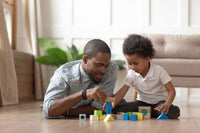By Michelle Mady
Have you ever asked a young child what they are thankful for on Thanksgiving? If you have, then I am sure you have a multitude of wonderfully giggle worthy answers you have heard. As a preschool teacher, every year we talk about “being thankful.” We talk about it for weeks, but gratitude is something that is a really abstract idea, making it difficult for young children to understand.
We talk about it for weeks, but gratitude is something that is a really abstract idea, making it difficult for young children to understand.
However, if you ask them what they want for their birthday or other holiday, they are very quick to give you a list of things they WANT. They may be totally feasible (my daughter wanted a trip to the moon for a few years), but they are clear ideas of gifts. So if thinking of receiving a gift is so easy for toddlers and preschoolers, how can we make the idea of gratitude more accessible to these children?
Change Your Phrasing
First, we have to think about our language. Even a child well versed in “please” and “thank you” doesn’t really understand what those words mean before their fourth birthday. So, we rephrase. Instead of asking a child what they are thankful for, ask them what they are happy they have! They may be happy that they have yummy food, fun toys, or a best friend as a brother. Just swapping the phrasing makes the concept easier to understand.
Model Language
If you are going around the table talking about what you are thankful for, consider having adults go first and offer tangible ideas. For example, mom might say “I am thankful that everyone is together at the table.” Then elaborate on what that means, in kid friendly vocabulary. Continue, “I am happy when the family is all together and enjoying the dinner Daddy made!” Adding on a reason why you appreciate something helps to give the abstract idea a bit of context and can give children time to think about the times they feel happy as well.
Keep Expectations Realistic
I can see it now. You have talked about what gratitude and thankfulness mean for weeks. You have prepped the children for the big Thanksgiving dinner. It’s the big day and you are asking each family member what they are thankful for or what they are happy they have. It’s your two year old’s turn. They say, “I am happy that we can watch Bluey after dinner is over.” The in-laws laugh, your mother shakes her head, and you frantically try to get them to say they are thankful for their health, or family, or anything better than trying to rush through dinner.
Kids just aren't always that deep.
They are likely very happy that the family is together, but they are equally likely to be overwhelmed by all the hoop-la and just want to go back to a normal no school day, hanging out with some goldfish watching Disney Junior. I mean, who can blame them? So keep your expectations realistic and be ready for an answer that might not jive with what you are hoping to hear. Not only is that normal, it’s developmentally appropriate!
-
About the author: Michelle is a mom of 5 children ranging in age from 5 to 15. As a toddler and preschool teacher, she shares experiences, activities and guidance to other parents, as both a parent and as a professional early childhood educator, at any stage of their parenting journey.




